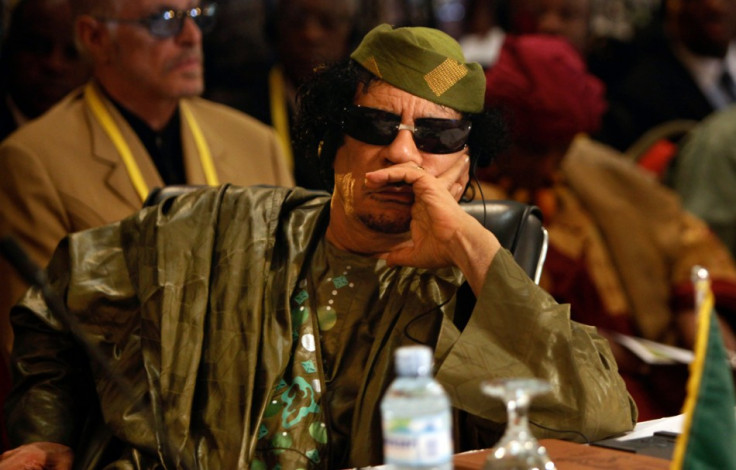Libya Conflict 2011: Burkina Faso, Algeria and Niger's Long Shared History with Colonel Gaddafi

As rebel forces continue the manhunt for fugitive leader Muammar Gaddafi in Libya's desert triangle, reports emerging said that more than 200 armoured vehicles, possibly sheltering Gaddafi and his sons, had crossed into Niger, with sources saying the colonel could be heading for Burkina Faso.
With Gaddafi's wife, daughter and grandchildren in Algeria and Burkina Faso and Niger reportedly agreeing on provide the former leader asylum, the National Transitional Council will find it difficult to fit in regionally, which could have dire consequences for the future of Libya but also its neighbours.
1. Burkina Faso
A landlocked West African state, Burkina Faso has long been a recipient of large amounts of Libyan aid.
While it had been hesitant about taking sides, and even recognized the rebel Transitional National Council as Libya's official government, Burkina Faso now says it would take the deposed leader.
"In the name of peace, I think we will take, with our partners in the international community, whatever steps are necessary," Yipene Djibril Bassolet, Burkina Faso's foreign minister, said Monday.
It is well known that Burkina Faso has benefited from Gaddafi's generosity (or clientelism) and Burkina Faso's president was also a former student of the World Revolutionary Centre (WRC), a training camp founded by Gaddafi in the 1980s, which Douglas Farah, an expert on the colonel once described as the "Harvard and Yale of a whole generation of African revolutionaries".
Compaore went on to overthrow and execute former leader and ally Thomas Sankara, in 1987 his government was involved in arming insurgencies in Sierra Leone and Liberia which Gaddafi also supported. Charles Taylor (Sierra Leone insurgency) and Faday Sankoh (Liberia insurgency) had also been members of the WRC.
Despite a long shared history the relationship between Burkina Faso and Libya were said to have become tensed recently, which explains Burkina Faso's recognition of the NTC.
However with millions of aid provided by Gaddafi throughout the years, Burkina Faso's foreign minister Yipene Djibril Bassolet said Gaddafi could still go into exile in the country. "In the name of peace, I think we will take, with our partners in the international community, whatever steps are necessary."
2. Niger
Throughout the conflict the rebels have claimed many of the foreign forces fighting for Gaddafi came from countries such as Niger. While many of the sub-Saharan Africans arrested in Libya insist they only are migrant workers who did not take part in the conflict, some mercenaries joined the pro-Gaddafi forces.
Just like in the case of Burkina Faso, Gaddafi has provided Niger with millions in aid as well as military assistance despite Libya claiming part of northern Niger as its own. Thousands of Tuaregs from Niger and Mali settled in Libya during Gaddafi's rule and while many worked as migrant workers, others incorporated the army, thus fighting for Gaddafi.
However following allegations that Tuaregs fighters were still protecting the former leader, Tuareg leaders in Niger and Mali are urging Tuareg fighters in Libya to shift their position and side with the NTC.
While many fear an en masse retour of former expat, which could put an extra weight on the already struggling economies of the two countries, other say a tensed relationship between tuaregs from Mali and Niger risk further destabilizing the Africa's Sahelian region, an already troubled area.
3. Algeria
Since the beginning of the conflict Algeria has been accused of helping the Gaddafi camp, by sending troops or selling arms, which the Algerian authorities have denied. Far from being Gaddafi's strongest ally in the continent, Algeria was however one of the colonel's closest northern-African friend with both countries sharing similar revolutionary ideologies, state controlled economic systems, and Organization of Petroleum Exporting Countries (OPEC) oil policies.
Their relationship was tainted in the 1970's after Libya tried to merge with Tunisia and despite officially acting as allies in the Western Sahara issue, both countries rapidly adopted very different position with Algeria pressing for an independent state while Libya wanted Arab unity.
While many claim Algeria actively supported Gaddafi, its opposition to the NATO operation and focus on negotiations can be explained by its domestic situation. Algeria was one of the few Arab countries to avoid uprisings during the Arab Spring but political tensions still run high while a resurgence of terrorism is also occurring, and by rejecting NATO the government hoped to protect itself from both protesters and terrorist, as many Algerians are still struggling to cope with a 150 years of French occupation which led to a bloody war of independence.
The problem is now that the NTC has grown wary of Algeria and by accepting the Gaddafi family; the Bouteflika government will only further aliment the narrative which sees the country as anti-NTC.
However defending the move and talking about the Gaddafis, Algeria Prime Minister Ahmed Ouyahia said "The Libyans themselves ... asked us to consider them as Algerians."
© Copyright IBTimes 2025. All rights reserved.





















